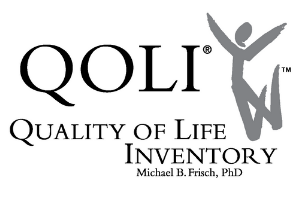Author:
Michael B Frisch
Age Range:
18 years and older
Administration:
Individual – Approx. 15 minutes (32 items with 3-point rating scale for importance, and 6-point rating scale for satisfaction)
Scoring Option:
Q Local™ Scoring and Reporting Desktop Software and Manual Scoring
Assess positive mental health and help guide clients to a happier life.
Brief yet comprehensive, the QOLI assessment yields an overall score based on the “Sweet 16” areas that make up happiness or quality of life such as love, work and play. The QOLI test is a measure of positive psychology and positive mental health. Assess the positive health, well being and quality of life of your clients. Help increase the happiness, meaning, and fulfillment of your clients by giving them overall feedback on their quality of life and feedback on the 16 areas of life that make up human happiness and fulfillment in cultures around the world.
How to Use This Test
This assessment can help laypeople, clients and professionals in a variety of settings.
- In clinical settings, the test is well-suited for planning, evaluating and tracking medical and psychological treatment and patient progress.
- In substance abuse/chemical dependency programs, test results can help build motivation for treatment and yield a blueprint for a balanced drug-free lifestyle.
- In positive psychology, personal growth counseling, and employee assistance programs, the assessment measures assets and strengths as well as problems in a non-pathological way.
- In gerontology settings, the QOLI assessment can be used to help measure “successful aging” as defined by leaders in the field.
- In career counseling, the test can help predict future job satisfaction and productivity.
- In research and quality assurance programs, QOLI test results can be used to help measure treatment outcomes for a wide array of physical and psychological disorders.
Key Features
- Evidence-based and empirically validated, according to Marty Seligman (2011, 2014)
- By helping to identify “real life” issues, the test can help clinicians develop relevant treatment plans and predict future health problems.
- By providing a positive mental health picture, the assessment can help increase the likelihood that treatment will be successful.
- In an EAP setting, the assessment can help identify employees whose satisfaction with life may be low. Helping these employees may, in turn, help reduce employers’ health care costs and improve workers’ productivity.
Scales
Health
Self-Esteem
Goals and Values
Money
Work
Play
Learning
Creativity
Helping
Love
Friends
Children
Relatives
Home
Neighborhood
Community
Overall well being
Psychometric Information
Normative data are based on 798 nonclinical adults sampled from 12 states from the Northeast, the South, the Midwest, and the West. The norm group is ethnically diverse.
Report Options
Profile Report
The QOLI profile report graphically presents the overall quality of life score and a weighted satisfaction profile for the 16 areas of life that make up the overall score. It also provides a brief narrative description of the person’s overall classification and lists areas of dissatisfaction that may need further exploration.
View a sample Profile Report.
Progress Report
The progress report summarizes the results of up to five administrations of the QOLI assessment.
View a sample Progress Report.
Scoring Options
Q-global™ Web-based Administration, Scoring, and Reporting – Enables you to quickly assess and efficiently organize examinee information, generate scores, and produce accurate comprehensive reports all via the Web.
Q Local™ Scoring and Reporting Desktop Software – Enables you to score assessments, report results, and store and export data on your computer.
Manual Scoring – Administer assessments on answer sheets and score them quickly yourself with an answer key.
Getting Started with the Q-global Training Series
View these brief training modules about Q-global:
Module 1: Gaining Access to Q-global
Module 2: Signing in and setting up your account
Module 3: Managing sub-accounts
Module 4: How to generate reports
Past Webinars
Adding Positive Psychology and the Quality of Life Inventory to Your Practice
Presenter: Michael B. Frisch, PhD
Presented by QOLI® author, Michael B. Frisch, Ph.D. “Quality of Life Therapy (which uses the Quality of Life Inventory) is an approach to positive psychology that is state-of-the-art, evidence-based, empirically validated, and the number one guide for clinical psychologists and other practitioners interested in learning about the practice of positive psychology.”–Ed Diener, co-leader of the positive psychology movement and Distinguished Professor of Psychology at the University of Illinois.
This webinar presentation will address:
- Quick and easy ways to add Positive Psychology to your clinical and coaching practice as recommended by Marty Seligman and Ed Diener.
- How the brief measure of positive mental health, the Quality of Life Inventory (QOLI), can help make your assessments more complete.
- How to quickly access research-supported positive psychology assessments and positive psychology interventions.
- How adding a small piece of Positive Psychology can boost treatment effectiveness and prevent relapse.
- How Positive Psychology can help you Develop a Coaching Practice in which you serve higher functioning individuals without DSM disorders.
The QOLI is a comprehensive five minute assessment that yields an overall score and a profile of problems and strengths in 16 areas of life such as love, work, and play. The QOLI can help laypeople, clients, and professionals in a wide range of settings including positive psychology, clinical psychology, substance abuse, gerontology, career counseling, OT, behavioral medicine, and quality assurance.
Recent “how to” article with current references and research support
Date: Mar 18, 2014
Adding Positive Psychology and the Quality of Life Inventory to Your Practice
Presenter: Michael B. Frisch, PhD
Presented by QOLI® author, Michael B. Frisch, Ph.D. “Quality of Life Therapy (which uses the Quality of Life Inventory) is an approach to positive psychology that is state-of-the-art, evidence-based, empirically validated, and the number one guide for clinical psychologists and other practitioners interested in learning about the practice of positive psychology.”–Ed Diener, co-leader of the positive psychology movement and Distinguished Professor of Psychology at the University of Illinois.
This webinar presentation will address:
- Quick and easy ways to add Positive Psychology to your clinical and coaching practice as recommended by Marty Seligman and Ed Diener.
- How the brief measure of positive mental health, the Quality of Life Inventory (QOLI), can help make your assessments more complete.
- How to quickly access research-supported positive psychology assessments and positive psychology interventions.
- How adding a small piece of Positive Psychology can boost treatment effectiveness and prevent relapse.
- How Positive Psychology can help you Develop a Coaching Practice in which you serve higher functioning individuals without DSM disorders.
The QOLI is a comprehensive five minute assessment that yields an overall score and a profile of problems and strengths in 16 areas of life such as love, work, and play. The QOLI can help laypeople, clients, and professionals in a wide range of settings including positive psychology, clinical psychology, substance abuse, gerontology, career counseling, OT, behavioral medicine, and quality assurance.
Date: Sep 19, 2013
Questions
Frequently asked questions follow.
Why should I use a nonpathologically oriented “happiness”assessment?
The QOLI assessment opens up a whole new area of assessment by broadening the criterion of “mental health” to include personal happiness and life satisfaction in addition to the absence of psychiatric symptoms. The QOLI assessment gives you a positive mental health instrument to augment other psychological assessments that focus on negative affect and symptoms.
The QOLI assessment can be used as a screening tool for mental health and physical problems. A low quality of life score is often a key symptom of psychological and physical disturbances and might also predict future health problems.
Addressing quality of life issues can also be crucial to the success of treatment. Some clients are discontent, even though their symptoms have remitted with treatment, because their quality of life has not improved. There is even some evidence that symptom reduction and improved functioning in everyday life cannot occur in psychotherapy unless the patient’s quality of life is enhanced.
Finally, the QOLI assessment can help clinicians develop relevant treatment plans by focusing both client and therapist on “real world” aspects of life, like work situation, living arrangement, etc. These areas can often be changed more quickly than cognitive or psychodynamic factors can.
Can the QOLI assessment be used for outcomes measurement?
Yes, the QOLI Progress Report can be used for individual outcomes measurement for interventions alleviating either physical illness or psychological disorders.
Aggregate QOLI assessment data can be used to evaluate the outcomes of diverse therapies to determine which type works best for which patients to improve their quality of life.
The QOLI assessment can also help managed care providers objectivelydemonstrate that their services have improved a patient’s quality of life. A 1992 Psychotherapy Finances article on managed care indicated that employers and payers will be tying income to providing effectiveness in three areas:
- work functioning
- use of medical benefits
- improved quality of life
What if an area of life is not important to the test taker?
Areas that are rated “Not Important” are not included in QOLI score calculations.
Complete Kit:
Hand-scoring starter kit:
Includes manual, 50 answer sheets and 50 worksheets
ISBN: 9780749159191





